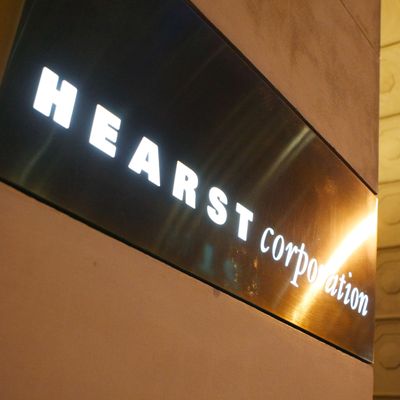
Hearst’s union-busting campaign is about to receive fresh scrutiny. On Thursday morning, the Writers Guild of America, East, filed an unfair-labor-practice charge with the National Labor Relations Board against Troy Young in his role as the president of Hearst Magazines, for what the union describes as an illegal effort to suppress the federal labor rights of his staff. By law, the NLRB must now investigate the union’s claims.
New York Magazine has viewed a copy of the filing, which provides further details about the union’s specific allegations. These are WGAE’s accusations against Hearst:
[Hearst] unlawfully engaged in surveillance of employees’ union activities and/or created the impression that employees’ union activities were under surveillance; solicited, encouraged, and/or provided assistance to employees to withdraw union authorization cards; told employees that they may have violated the Act by signing union authorization cards; and otherwise restrained and coerced employees in the exercise of the rights guaranteed by Section 7 of the Act.
The allegations are based on details previously reported by New York. Hearst isn’t the first media company to refuse to voluntarily recognize its union; neither did NBC, where unionizing staff recently won an election to join the NewsGuild. (Disclosure: New York editorial staff are also represented by the NewsGuild.) But Hearst’s endeavors to suppress union efforts are heavy-handed by the standards of the broader media industry, even if they aren’t totally unusual for employers overall. One Hearst employee previously told New York that they were told by management “that if I didn’t trust them, I didn’t have to work there.” In a recording of a meeting organized for staff that the company intends to classify as supervisors, Mark Theodore, an attorney for Proskauer Rose, and Adam Colon, Hearst’s labor and employment attorney, can be heard urging staff present to tell the union they wanted to revoke any authorization cards they’d signed.
Hearst didn’t stop there. As Vice reported earlier this month, it created a misleading, sometimes factually inaccurate website designed to dissuade staff from unionizing. It may also have created, and then deleted, a Twitter and Instagram account designed to launched a union-busting campaign on social media. And on December 13, Bloomberg Law reported that a mysterious union called the Hearst International Employees Association, or HIEA, had filed to intervene in WGAE’s election at Hearst. The HIEA says it already represents about 79 Hearst employees, and that it is open to workers on both the business and editorial sides of the company. But the HIEA bears hallmarks of a “company union,” defined by federal law as a union that “lacks majority employee support,” or “has majority support only because an employer coerced it.” WGAE told Bloomberg Law that Hearst staff seeking to unionize had never even heard of HIEA. As Bloomberg Law explained, the National Labor Relations Board is now investigating the HIEA’s legitimacy.
Now the NLRB will also have to determine whether Hearst violated federal labor law. That’s a slightly risky prospect for the union: After President Trump took office, his administration packed the board with conservative, corporation-friendly appointees. (The board’s general counsel, Peter Robb, once worked for Proskauer Rose, just like Theodore.) But regardless of the outcome, the charge is undoubtedly an embarrassment for the company, which has insisted repeatedly to staff that its workplace culture is already progressive without a union.
From 2016 to 2017, just over 41 percent of all private-sector employers were charged with violating federal labor law in elections supervised by the NLRB, the Economic Policy Institute reported earlier this month. EPI also estimated that employers spent around $340 million on consultants and attorneys who specialize in “union avoidance,” better known to most as union-busting. EPI says its data affirms earlier findings, published in 2009, that “anti-union activity may be increasing among employers.” Hearst is part of a trend, and not a progressive one.






























